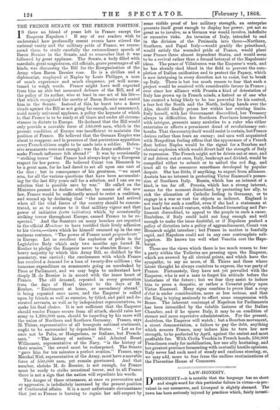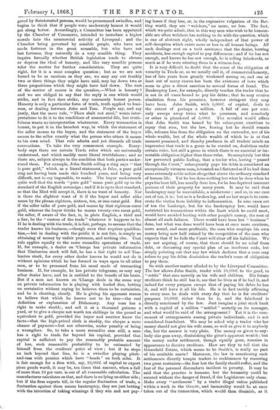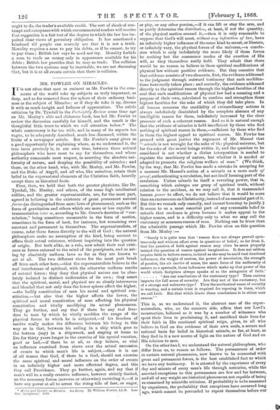LA W -HON ESTY.
DISHONESTY—it is notable that the language has no short and simple word for this particular failure in virtue—is pre- valent in our commerce, and Liverpool is slightly alarmed. The town has been seriously injured by practices which, fairly investi- gated by disinterested persons, would be pronounced swindles, and begins to think that if people were moderately honest it would get along better. Accordingly, a Committee has been appointed by the Chamber of Commerce, intended to introduce a higher morale into the commercial activity of Liverpool ; and the Chamber being governed by sensible people, who have not made fortunes in the great scramble, but who have not lost fortunes, they naturally do a very sensible thing. They inquire formally whether British legislation tends to elevate or depress the ideal of honesty, and like very sensible persons refer the matter for further consideration. They are quite right, for it is a most complex question ; but as we are not bound to be as cautious as they are, we may say out frankly two or three things they might have said, may lay down two or three propositions which they might have laid down. The root of the matter of course is the question,—What is honesty ? and we are obliged to say that the reply is one which would strike, and in fact does strike, any commonly honest person. Honesty is only a particular form of truth, truth applied to busi- ness, or dealing between John and Tom. People say, and say justly, that the mere rule, "Thou shalt not steal," wants inter- pretations to fit it to the conditions of commercial life, but truth- fulness wants no interpretation whatsoever. Every transaction is honest, to put it in the broadest way, in which the statement of the seller means to the buyer, and the statement of the buyer means to the seller exactly what the person who utters it means to his own mind. That rule admits and yet discards all trade conventions. To take the very commonest example. Every- body says there are certain Trade rules which are universally understood, and which modify mere literal truthfulness ; and so there are, subject always to the condition that both parties under- stand them. For example, John Smith selling a ring says " that is pure gold," which, as a literal statement, is false, a pure gold ring not having been made this hundred years, and being very difficult, not to say impossible, to make. The buyer understands quite well that the words "pure gold" mean pure gold up to the standard of the English sovereign ; and if it is up to that standard, so that the Mint will accept it, there is no want of honesty. Nor is there the slightest want of it if the buyer and seller alike mean by the phrase eighteen, sixteen, ten, or one-carat gold. But if the seller talks of pure gold, and means by that eighteen-carat gold, whereas the buyer thinks he means twenty-two carat gold, the seller, if aware of the fact, is, in plain English, a thief and a liar, be the "custom of the trade" whatever it happens to be. If he is dealing with the trade, it is fair, perhaps, to assume that the trader knows his business,—though even that requires qualifica- tion,—but in dealing with the public it is not fair, is simply an obtaining of money by unfair pretences, and nothing else. That rule applies equally to the more recondite operations of trade. If, for example, a dealer on 'Change has private information that Timbuctoo stock will fall, he has a fair right to sell Tim- buctoo stock, for every other dealer knows he would not do it without opinions which he has formed in ways open to all other men, or to be presumed from his usual mode of transacting business. If, for example, he has private telegrams, so may any other dealer have, and he is entitled to the benefit of his brain. But if a man not known on 'Change deals in the same way on private information he is playing with loaded dice, betting on certainties without saying he believes them to be certainties, and he is cheating, clearly. He is giving his opponent reason to believe that which he knows not to be true—the real definition or explanation of Dishonesty. Any man has a right to make shoddy, and sell it at a thousand guineas a yard, or to give a cheque not worth ten shillings in the pound as equivalent to gold, provided the buyer and receiver know the facts—that the high-priced cloth is shoddy, the cheque a mere chance of payment—but not otherwise, under penalty of being a wrongdoer. So, to take a more recondite case still, a man has a right to trade far beyond his capital, provided that capital is sufficient to pay the reasonably probable amount of loss, such reasonable probability to be estimated by himself from the creditors' point of view ; but if he steps an inch beyond that line, he is a swindler playing pitch- and-toss with pennies which have " heads" on both sides. It is fair enough for a firm with, say, 10,0001. of capital to export piece goods worth, it may be, ten times that amount, when a fall of more than 10 per cent. is out of all reasonable calculation. The manufacturer calculates on that, and there is no lying on either side ; but if the firm exports till, in the regular fluctuation of trade, a fluctuation against them means bankruptcy, they are just betting with the intention of taking winnings if they win and not pay-
ing losses if they lose, or, in the expressive vulgarism of the Bet- ting world, they are " welchers," no more, no less. The fact, which we quite admit, that in this way men who wish to be honour- able are often welchers has nothing to do with the question, which is one of abstract right, wholly independent of that power of self-deception which exists more or less in all human beings. All such dealings rest on a tacit assurance that the dealer, barring accidents, has enough capital to pay differences ; and if he has not enough, and knows he has not enough, he is telling falsehoods, as much as if he were uttering them in a witness-box.
It is very difficult to doubt that the sense of the obligation of veracity iu Trade or, as we usually call it, of commerciallonesty, has of late years been greatly weakened among us, and one at least out of many causes has been the existence of laws which seem to give a direct sanction to several forms of fraud. The Bankruptcy Law, for example, directly teaches the trader that he is not in all cases bound to pay his debts ; that he may receive absolution from his promises, however stringent they may have been. John Smith, with 5,0001. of capital, deals to the extent of perhaps a million. A fall of one per cent. only sweeps away twice what he possesses, and somebody or other is plundered of 5,000/. The moralist would affirm that John Smith was bound by his subsequent exertions to repay that sum, but the law, fearing lest he should remain idle, releases him from the obligation on the surrender, not of his whole wealth, but of the whole wealth of which he is at that moment possessed, and thereby produces in all traders' minds an impression that trade is a game to be carried on, doubtless under certain rules, but still a game in which there is no essential or im- mutable obligation higher than those rules. So completely has this law perverted public feeling, that a trader who, having "passed through the Court," subsequently pays his debts is considered an exceptionally virtuous man, is toasted and flattered as if he had done some extremely noble action altogether above the ordinary standard of human life. Yet he has done nothing but what he does when he pays his boot bill, has usually done less, for he has deprived innocent persons of their property for many years. It may be said that bankruptcy may be unavoidable, a misfortune ; and so, in one case out of ten, it is ; but so is a broken leg, and no law steps in to exon- erate the victim from liability to inflammation. In nine cases out of ten the bankrupt, but for the bankruptcy law, would have restricted his transactions within the limit which he could meet, would have avoided betting with other people's money, the root of almost all such failures. There would have been less " business" done, but what was done would have been at once more cautious, more sound, and more profitable, the man who employs his own money being now half ruined by the competition of the man who expects that if he fails the Court will clear off his liabilities. We are not arguing, of course, that there should be no relief from debt, or discussing any special plan of an insolvent code, but simply pointing out that any law which declares that a man may refuse to pay his debts diminishes the trader's sense of obligation to pay them.
So with another matter alluded to by the Liverpool Committee. The law allows John Smith, trader with 10,0001. to the good, to "settle" that sum secretly on his wife and children. His future creditors think he still has it, see that he lives as if he had it, and indeed for every purpose except that of paying his debts he has it, and will have it all his life. He is in fact tacitly affirming to every man he deals with every day that he is for creditors' purposes 10,0001. richer than he is, and the falsehood is directly sanctioned by the law. Just imagine a joint stock bank with a capital of a million " settled " secretly on its manager, and what would be said of the arrangement? Yet it is the com- monest of arrangements among private individuals, and is not considered fraudulent. We may be asked why a trader who has money should not give his wife some, as well as give it to anybody
else, but the answer is very plain. The money so given to any- body else goes away, diminishing the giver's apparent wealth ; but the money under settlement, though equally gone, remains in appearance to deceive creditors. How are they to tell that the Greenfield Estate, which seems to be Smith's, is really no part of his available assets? Moreover, the law in sanctioning such
settlements directly tempts traders to recklessness by removing two great restraints—the fear lest the family should suffer, and the fear of the personal discomforts incident to poverty. It may be said that the practice is humane, but the humanity could be
secured without the danger of fraud, if the Legislature only chose. Make every "settlement" by a trader illegal unless published
within a week in the Gazette, and immorality would be at once taken out of the transaction, which would then diminish, as it
ought to do, the trader's available credit. The sort of shock of con- tempt and annoyance with which ourcommercial readers will receive that suggestion is a fair test of the degree to which the law has im- paired clear views of pecuniary obligation. It has sanctioned a falsehood till people can scarcely see that it is not a truth. Morality requires a man to pay his debts, or if he cannot, to try to pay them ; British law says he need not try. Morality forbids a man to trade on money only in appearance available for his debts ; British law provides that he may so trade. The collision between the two syatems may be inevitable, we are not discussing that, but it is at all events certain that there is collision.




































 Previous page
Previous page